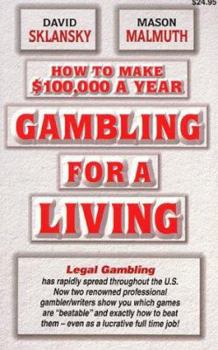Gambling for a Living: How to Make $100,000 a Year
Select Format
Select Condition 
Book Overview
Is there really such a thing as a professional gambler? The answer is an unequivocal yes! The authors of this book are but two examples. The truth is that there are many thousands of people around the... This description may be from another edition of this product.
Format:Paperback
Language:English
ISBN:1880685167
ISBN13:9781880685167
Release Date:October 2022
Publisher:Two Plus Two
Length:332 Pages
Weight:1.14 lbs.
Dimensions:0.9" x 5.5" x 8.5"
Customer Reviews
4 ratings
Good introduction to gambling
Published by Thriftbooks.com User , 17 years ago
This book gives the reader a good review of general gambling concepts and the different games available. To make 100k a year you'll need to get more specific material on the the gambling venue(s) of your choice.
money maker
Published by Thriftbooks.com User , 17 years ago
I am a great fan of David Sklansky's work. I have bought several of his books. I did buy this and getting the best of it which are similar in content you may not need them both. Perhaps this one is the better of the two if I had to chose. If you can afford both get both however.
A clear introduction, but dated and a little shallow
Published by Thriftbooks.com User , 18 years ago
Sklansky and Malmuth do a good job of introducing the reader to the world of gambling for a living. They make it clear just which games can be beaten and which can't (see below) and which may be beaten depending on circumstances (e.g., progressive slots and video poker). The authors also give a brief sketch of casino games that cannot be beaten (at least by normal means) such as craps, roulette, keno, etc, and point out why they can't be beaten. Clearly if you hope to make a living gambling you will become an expert on one (or more) of the four major games that can be beaten. They are horse race betting, sports betting, poker, and blackjack. The authors introduce the games with an emphasis on the circumstance and milieu in which you will find yourself. For example, if you are going to play blackjack for a living you have to get the basic strategy down pat, learn to count cards unnoticeably, and even learn to dress and behave appropriately so that it takes a long time for the pit bosses to realize that you are a winning player and throw you out. If poker is your choice then you'll have to learn the game(s) through experience (with some help from the literature). You'll start at the small games and work your way up, all the while making sure you have a sufficient bankroll separate from your living expenses. Sklansky and Malmuth make a big deal about this, but I can tell you from personal experience more would-be professionals failed because they couldn't or wouldn't play within their bankroll than for any other reason. It's called "gambler's ruin." Many of the guys I knew who managed to stay in the game year after year had a working wife or rich parents or some other means to fall back on after they went bust. The authors recommend from 200 to 300 times the big bet in your game as a minimum stake against a bad run of cards. This will vary depending on your variance, your style, how many hands you play, and against whom. Of course if you play too many hands you become a loser no matter how skilled you are. Play against the best players in the world and you also find yourself "on the rail," which is why Sklansky and Malmuth also recommend that you spend some serious time selecting the games to play in, that is, find the easiest games available at your bankroll and skill level. The section on sports betting is encouraging, as the authors show how the bookie's line can be beaten, but what the authors fail to say is that these opportunities (a line out of line, so to speak) come up much less often than bettors would like; in fact so seldom that unless you are betting tens of thousand of dollars on the games, it is very difficult to make a living betting on sports. Furthermore, behind the sly insights one might have into the psychology of a particular game situation--as opposed to an analysis of the comparative strengths of the teams ("power ratings")--is the assumption that (1) such factors are not already in the line; and (2) the spo
For us aspiring pros, here's some guidance!
Published by Thriftbooks.com User , 25 years ago
An excellent review of the games that are beatable and the math that supports these conclusions. They differentiate between a "gambler" and an "investor". For example, the skilled card counter in blackjack can have the same edge over the casino as the house has over the baccarat player. In spite of the subtitle, I'm not sure how realistic the possibility of consistently winning $100K a year is. Mastering one discipline is hard enough. The authors appear to have made a "killing" in many areas from horse racing to sports betting. For blackjack players, the articles on when to quit and toking are worth the price of the book.






